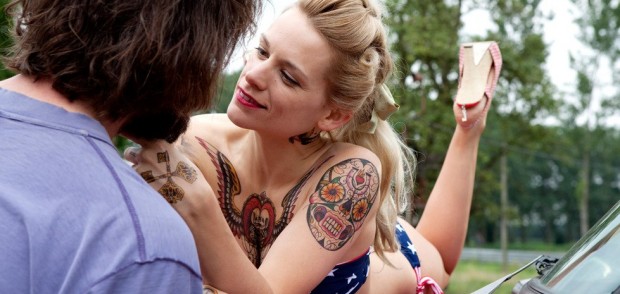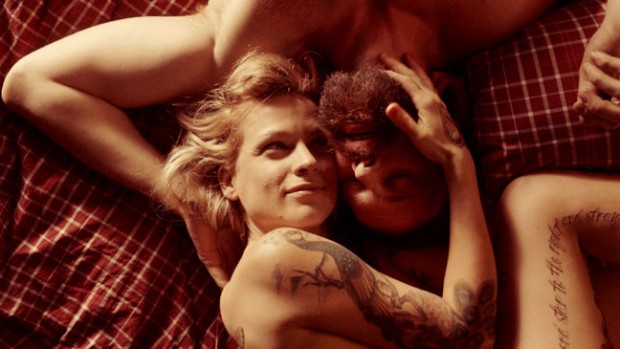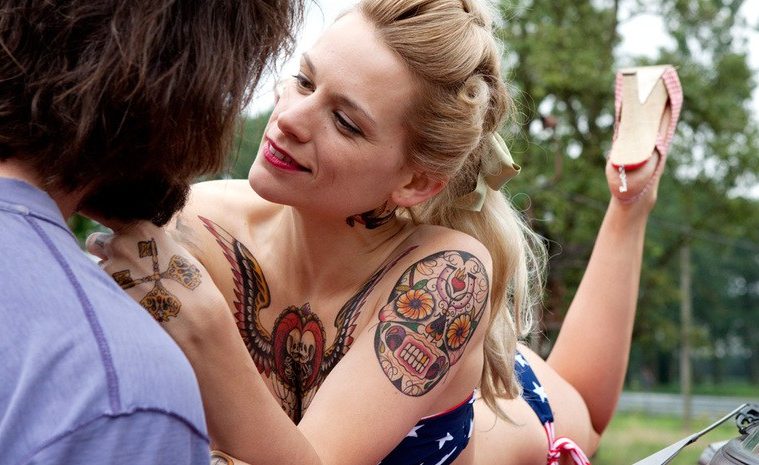
One of the most extraordinary films of the last year, the Belgium bluegrass drama The Broken Circle Breakdown, screened to great acclaim stateside at the 2013 Tribeca Film Festival before obtaining an Oscar nomination for Foreign Language Film. The powerful, non-linear story follows several years in the life of Elise aka Alabama, a tattoo artist (played by Veerle Baetens), and an American obsessed musician Didler, with the stage name Monroe (Johan Heldenbergh). The film beautifully interweaves past and present creating a rich, emotionally and politically charged tapestry.
The Film Stage recently spoke with director (and co-screenwriter) Felix Van Groenigen and lead actress Veerle Baetens about the process from adapting Johan Heldenbergh and Mieke Dobbels’ hit play to its political influences to getting ready for Oscar Sunday. Broken Circle Breakdown is currently available on VOD and is screening in select cities nationwide via Tribeca Film and one can check out our full conversation below.
The Film Stage: Thank you for talking with us.
Veerle Baetens: With pleasure.
It’s a very beautiful movie – can you tell me how the story came about?
 Felix Van Groeningen: Thank you. The film was based on a great theatre play by Johan [Heldenbergh]; it was a big hit in Belgium. I went to see it twice and I was very much intrigued by it because it has the same emotional impact as the film. But on the other hand it wasn’t very cinematic. So I played with the idea, and it was just too hard; I said I wasn’t going to do it. But it just kept coming back to me, so six months after the first time, I just tried it again. I started working with Charlotte Vandermeersch, the screenwriter, and step by step it led to a movie.
Felix Van Groeningen: Thank you. The film was based on a great theatre play by Johan [Heldenbergh]; it was a big hit in Belgium. I went to see it twice and I was very much intrigued by it because it has the same emotional impact as the film. But on the other hand it wasn’t very cinematic. So I played with the idea, and it was just too hard; I said I wasn’t going to do it. But it just kept coming back to me, so six months after the first time, I just tried it again. I started working with Charlotte Vandermeersch, the screenwriter, and step by step it led to a movie.
It is a non-linear film. Was the play also non-linear – what were the decisions you made in adapting the material?
FVG: The moment I started working on it, I knew we were going to have to play with time. It worked really well in the play. The play wasn’t told in flashbacks, it was two people talking. But we knew very quickly that it was about an ex-couple that lost a kid, but knowing that made the stakes very high. And it worked well on stage, knowing where we were and being afraid of that, and we wanted to know more and more. That made me think, for the adaptation that we’d have to play with time. In developing the screenplay we created three timelines and we were going back and forth, but it was more of a classic structure. On paper it worked fine, but when we saw the first cut we realized it wasn’t as emotional as the theater piece. Then we started over, throwing away the script and working with the material in the edit room.
Was it a test audience that helped you determine this? The film is really brilliant in that its disorienting yet engaging then things all start to snap together in the third act.
FVG: When we started playing with it, we didn’t know if it would work. We brought in a small test audience — a few friends that we invited — and when we saw they never doubted where they were in the story, it encouraged us to push the limits. It was an amazing ride we were on, and it just happened while we were working on it.
It’s really great — it works! Veerle, can you discuss how you prepared for the role of Elisa? Were you a musician?
VB: Actually I saw the play twice, too, even before I knew I was going to get involved. I was crazy about the play, and then I got to audition for the movie and got the part – and was very happy about that. The preparation was actually really refreshing because Felix got us to rehearse six months in advance for the music, then one month in advance for the character building and the relationship between Johan and me. It was like going back to school, when you had time to develop a character and someone was guiding you through the process. Apart from that, I’m someone who likes to prepare by reading books that describe people, and think about astrological signs. It really pinpoints people; it puts them into groups. That’s how I do character development.
Did the music help? Of course there are themes in the songs that play into the narrative?
VB: Yes, it did actually. I think the music is the basis for it all, the music is very honest and true – the character of Elise, for me, comes out. It’s represented very well, so it gives her a depth, and simplicity and truthfulness to it, like Elise.

Can you talk about the political influence? Of course there is a scene where the camera focuses its attention to George Bush vetoing funding for stem cell research. Was that also an element from the play or was that brought in?
FVG: It was very much in the play. I think it was even a bit more. It was just important for Johan – he’s very much like Didier – not in his anger, but he has ideal picture of how things should be. He did see Bush stop stem cell funding and it made him very angry. He said OK, ‘I’d like to talk about religion, and how religion is trying to interfere in my life.’ And it inspired the play. At the same time he discovered bluegrass music, which is also very religious music, and somehow he put those two together and told this magical story. He doesn’t take sides – he tells both sides – they need each other but at the same time cannot live with each other. I felt it needed to be in the movie, which is why I set the film in the 9/11 era.
I know the film was made a few years ago, but it’s now screening throughout the world. What’s been the most surprising thing about the reception it’s receiving?
FVG: It’s crazy. The last few months I’ve been doing promos for the movie and traveling all over the world – Brazil and Columbia lately. We’ve got the Oscar nomination and a nomination for the Best Foreign Language film in France – so it’s crazy. I’m so happy, because when we were working on it, it felt really special and it’s great to know we weren’t mistaken.
It’s a really beautiful movie – anything else you want to tell us before you take off?
FVG: Yep, no we’re very happy to be nominated for an Oscar and we’re enjoying the ride.
The Broken Circle Breakdown is currently screening in select cities and is available on iTunes, Amazon Instant Video, Vudu and Google Play. More information can be found here.

